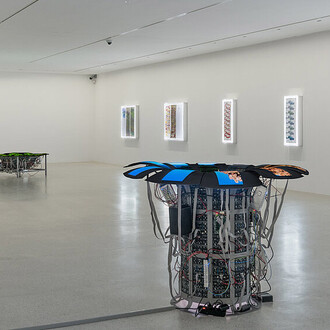For her exhibition at mumok, Small Habit Revolution, artist and filmmaker Loretta Fahrenholz has created two new pieces that address key feminist works of the 1940s and their transfer into various Internet formats. Story in Reverse is a multi-part slide installation based on Ilse Aichinger’s Mirror Story (1949), a linguistic experiment that narrates a young woman’s tragically failed life. In Aichinger’s text the beginning and the end of life merge, as the story of the woman starts at her grave and is then told backwards by a second-person narrator.
For Story in Reverse Loretta Fahrenholz worked with graphic designers and illustrators from the online service platform Fiverr, who freely retell Aichinger’s short story in drawings and comics. Fahrenholz uses analogue slide projectors to show the resulting visuals in the exhibition gallery, using projections of different sizes and in different directions, and with varying degrees of clarity.
The second older work that Small Habit Revolution refers to also involves the death of a young woman. This is Maya Deren’s avant-garde film classic Meshes of the Afternoon, a fourteen-minute short film that Deren made together Alexander Hammid, her husband at the time, in 1943. Meshes of the Afternoon shows a woman’s nightmare in gloomy hallucinatory images. She is seen pursuing a figure cloaked in black, going about daily business and routines, and then at the end of the afternoon she commits suicide. This story draws on Deren’s personal memories and dreams and was made in her own house. It offers no easy interpretation. By using a large number of filmic devices—repetition, a shaky camera, rapid cuts, shadow, mysterious symbols, and more—Meshes of the Afternoon leaves a deeply surrealist and irritating impression.
















